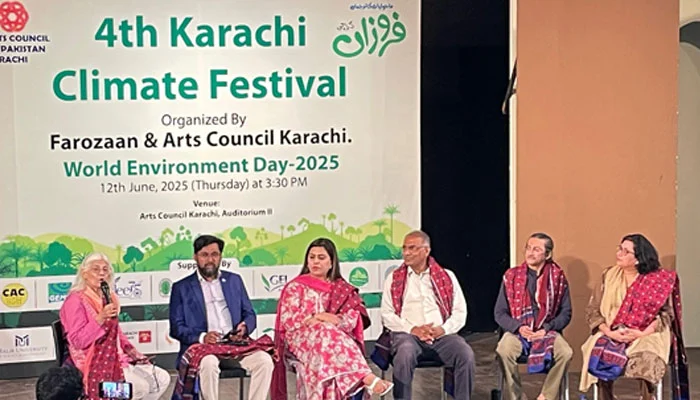The Arts Council of Pakistan hosted the fourth Karachi Climate Festival on Thursday, in observance of World Environment Day, aiming to spotlight the escalating effects of climate change within the metropolis.
Commencing with the Climate Risk Index 2025 — which positions Pakistan among the most globally vulnerable countries — the festival addressed critical issues such as unjust water distribution, the intricate link between climate and public health, and the media’s role in fostering climate awareness in Karachi, among other topics.
The insightful panel discussion was moderated by Afia Salam and featured Muhammad Toheed, Munazza Siddiqui, Mahapara Khan, Saeed Baloch, and Yasir Khan as key speakers.
Muhammad Toheed, a Karachi-based urban planner, emphasized that the city confronts two particularly alarming challenges: persistently rising temperatures and increasing urban flooding.
“The city’s average daytime temperature has gone up by 1.6 degrees Celsius while night time temperature has increased by 2.4 degrees,” stated the urban planner, citing a study conducted at the Karachi Urban Lab based on 60 years of MET [Pakistan Meteorological Department] data.
Exploring the nexus between climate change and public health, Public Health Expert Mahapara Khan outlined the growing prevalence of waterborne diseases, temperature-induced illnesses, and respiratory issues attributable to vehicular emissions and unregulated fuel burning.
“Diseases are increasing due to rising temperatures. This includes dengue fever, polio, diarrhea, pneumonia, lung and cardiovascular diseases,” she explained.
At this point, the moderator Afia Salam—a renowned environmental expert—interjected to clarify the connection between high temperatures and dengue fever, stating, “due to rising temperature, dengue fever increases [in Karachi] as dengue mosquitoes are now breeding in the areas where it not used to do.”
Munazza Siddiqui, a senior journalist, voiced concerns over limited climate reporting and coverage, attributing this lack of attention to the public’s minimal interest in such news.
Furthermore, she dispelled the misconception that the media fails to provide adequate coverage to climate change issues. She offered a compelling example, explaining, “heatstroke-related deaths are under-reported because when the reporters go to hospitals [to get data], they are told unofficially by the hospital staff that they got instructions from senior government officials that heatstroke-related deaths should be put in other health categories… government officials—including politicians and bureaucrats—want to protect their public image.”
Yasir Hussain, an environment expert and head of the Climate Action Centre Karachi, underscored the critical importance of climate data and public awareness. He urged the government to extend support to community-led adaptation programs across both urban and rural Pakistan.
Saeed Baloch, the General Secretary of the Pakistan Fisherfolk Forum, shed light on the heightened vulnerability of coastal communities to climate change. He strongly condemned the practice of dumping untreated industrial wastewater into the Arabian Sea, a practice that poses a severe threat to aquatic ecosystems and traditional livelihoods.



